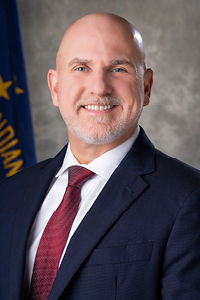Baldwin files bill to increase curriculum transparency, empower parents

State Sen. Scott Baldwin (R-Noblesville) recently filed Senate Bill 167, which would allow parents to play a more active role in their child’s education and remove divisive concepts from Hoosier classrooms.
“Over the past several months, I have been meeting with parents, teachers and various education stakeholders who are frustrated with divisive ideologies creeping into classrooms across the country and in our state,” Baldwin said. “I authored this legislation with the intent of making sure parents can be more aware of and involved with what their children are learning in our public schools. In fact, teachers verbalize the need for more parental involvement, and I want to encourage that level of collaboration between parents and teachers.”
Curriculum Transparency, Parental Involvement
SB 167 would improve transparency by requiring school districts to make all of their curricular materials available for parental review and requiring the creation of local curricular materials advisory committees consisting of parents, teachers and other community members. These committees would have the ability to review all curricular materials and make recommendations to their local school boards.
This legislation would also require schools to get parental consent before administering behavioral surveys to students or providing ongoing mental, social-emotional or psychological health services to students, allowing parents to be more involved in their child’s wellbeing, using their own discretion.
Material Harmful to Minors, Divisive Concepts
Additionally, SB 167 looks to protect children by making schools and public libraries subject to the same liability standard as other institutions open to children for illegally disseminating material harmful to minors.
“Blatantly harmful material deemed illegal on the street corner shouldn’t be considered legal in a school library,” Baldwin said. “Indiana’s existing laws on material harmful to minors do not target reputable art, literature or scientific discussions, and nothing in my bill seeks to change those standards. I am simply seeking to even the playing field so that materials illegal outside a school are also illegal inside a school.”
Lastly, SB 167 would prohibit public schools and teacher preparation programs at colleges from teaching certain concepts that divide and stereotype people into groups based on sex, race, ethnicity, religion, color, national origin or political affiliation. Specifically, schools would not be able to teach that one of these classifications:
· Is inherently superior or inferior to another;
· Is inherently racist, sexist, or oppressive whether consciously or unconsciously;
· Should be discriminated against or receive adverse treatment;
· Should be treated differently because of their background;
· Determines an individual’s moral character;
· Bears responsibility for actions committed in the past by other members of that group;
· Should feel discomfort, guilt, anguish or any other psychological distress based on their group; or
· Uses neutral concepts such as meritocracy and work ethic to oppress people of different backgrounds.
“Our schools should be an inclusive place where respect is shown equally. Teaching concepts that divide our children into one group or another only serves to drive a wedge between individuals and distracts from the main goal of educating our children,” Baldwin said. “This bill is not about preventing our teachers and schools from talking about our history – good and bad.”
Parents and school employees who believe a school has violated the new law would be able to bring a complaint to the local school administration, the school board, and then to the Indiana Department of Education, under processes defined in the bill. If the parent or employee still believes the situation is unresolved after exhausting the defined processes, the parent or employee could then file a civil complaint against the school in court.
“I trust that teachers can handle the vast majority of misunderstandings or complaints if they are just afforded the opportunity to be included in the discussion before it escalates,” Baldwin said.
The Indiana General Assembly is set to reconvene for the 2022 legislative session Jan. 4.
